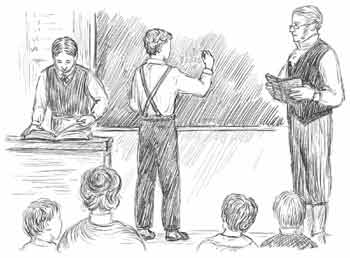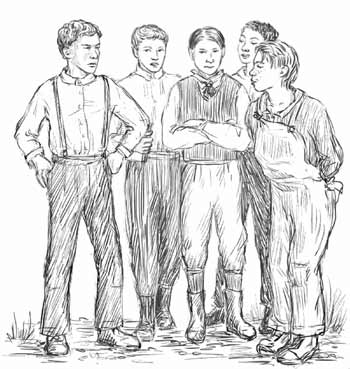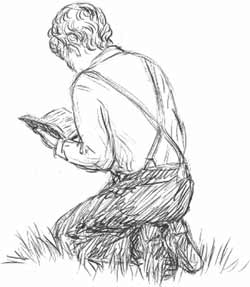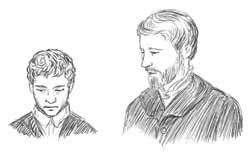Chapter 20
“Let him that thinketh he standeth take heed lest he fall.” (1 Corinthians 10:12)
“Here, Tip!” said Howard Minturn; “hold this frame steady while I try that nail. Will, don’t put that one up so high, it ain’t even with the others. Hold on, Ellis—catch hold of this stool, it’s tipping. There, now, it’s all nice and in order—isn’t it, Mr. Burrows?” And he sprang from his stool, as their teacher entered the schoolroom door.
“Very likely,” answered Mr. Burrows, smiling; “only I didn’t hear what you said.”
“I say we’re ready for examination, room and all.”
“The room is, certainly; and I hope your brains are. Ellis, I’d move that chair a little to the left; it will be in the way of the classes as it stands now. Do you feel brave today, Edward?”
“Yes, sir,” answered Tip promptly, “pretty brave.”
And he did, besides feeling eager and excited. The long winter term was over; today and tomorrow were to be days of examination. The boys had been working hard for it—none harder than had Tip. It was the first examination which had ever come to him in this exciting way. Always before he had been among the few inevitable dunces, running away from examination altogether, or else laughing good-naturedly over his own blundering ignorance. But today it was different: he stood there on the stage among the workers, proudly answering his teacher’s questions. He looked over at the group of idlers who loitered near the windows—Bob Turner at their head—and wondered that he could ever have been of their number.
This was going to be a great day for Tip. It is true he was far behind some others of his age, so far behind that the advanced classes of Howard Minturn and Ellis Holbrook would not even be examined until the next day—while all of his came that morning. But then Tip knew there was change enough in him to call the attention of everyone present. He felt the change in himself. His mother felt it, when she had that morning brushed his hair for him, and fastened a clean collar on his jacket. And the boys in school felt it. He had taken his place among the workers.
The bell rang at last, and the scholars filed in and took their places. There were visitors, even in the early morning; the people liked to attend Mr. Burrows’ examinations. Tip’s class in reading came first on the list, and never had his eyes been so bright or his face so eager. Tip had learned to read. Patiently, earnestly, he had plodded on through the long winter; now his sad blunderings in that line were over for ever; not a boy in school read more slowly, distinctly, and correctly than Tip Lewis. The selections were to be made by the committee, immediately after class, of those who were considered ready to enter the history class on the following term. This was the highest reading class in the school: and Tip’s eyes fairly danced when Mr. Holbrook, who was chairman of the committee, out of a class of thirteen read but two names—“Thomas Jones” and “Edward Lewis.”
“Hallo, Tip!” Howard Minturn had said to him at recess. “Let’s shake hands. Welcome to history; it’s awfully hard and interesting.”
And Tip did shake hands, and laughed; and looked over at the other group—the dunces—with a half-patronizing nod to Bob Turner; and wondered how he could have borne it if he had been numbered with them that day. He felt that he was climbing towards the top, and climbing fast.
In spelling, too, he came off conqueror. He spelled down the class, spelled until Mr. Burrows closed his book with the words, “I presume you are tired of this, gentlemen, and, as our examinations are confined to the lessons, I think it will hardly pay to go further, for Edward has not missed any since the second week in the term.”
So again, flushed and excited, Tip went to his seat victorious. Only arithmetic now, and he would be through with the working part of the day. It was the last recitation in the morning, and he was so eager and anxious to do well, that he began to grow nervous.
The class was called at last. They had gone slowly and carefully through long division, and would be ready for fractions next term. The recitation passed off finely. Tip had not studied day and night during the winter for nothing. He was at the board, working an example in long division; it was almost finished. The hand of the clock pointed to ten minutes of twelve. In ten minutes he would be through, and his name would stand on that honored list, among those who had not missed one word or made one mistake during the examination. His hand began to tremble. What was the matter with that example? Oh, what was the matter? The remainder was too large; no—it was too small; no—it was—he didn’t know what! Everybody was watching him; he heard a boy laugh softly. He had made a mistake, then—what was it? Where was it?

Mr. Burrows’ voice came to him, calm and kind: “Edward, don’t get excited. Look at your remainder closely. Take the first figures of divisor and remainder—nine in thirty-one, how many times? That will help you.”
Ellis Holbrook stood but a step from the blackboard, just behind him. Tip heard his low whisper, “Seven,” and, without waiting to think—indeed, he was too nervous to think—he caught at the number.
“Seven times!” he said hurriedly.
Then he heard bursts of laughter from the boys, and dashed down his chalk in an agony of shame and pain. And the clock struck twelve!
The honor was lost.
The boys gathered around him after school was closed.
“It was too bad, Tip,” Howard Minturn said, in a tone of honest sympathy. “You’d have had it in a minute more.”
“I’d have had it if it had not been for Ellis Holbrook, and he’s a mean scamp!” Tip answered, in a rage.
“Whew!” said Will Bailey; “what did Ellis do?”
Hearing his name, Ellis turned and proudly confronted the angry boy.
“He told me wrong just on purpose,” said Tip. “That’s what he did, and he knows it.” And he broke away from them, and dashed out of the room.
Howard Minturn stood aghast! He could not believe that Ellis Holbrook, his best friend, and the very pink of honor among the boys, should do so mean a thing. And yet it was hard to think that Tip had not told the truth.
“What does he mean, Ellis?” he asked at last.
“You’ll have to ask him if you want to find out,” said Ellis haughtily. “He knows better than anybody else what he means, I guess.”
Presently the boys started homeward in a body. Bob Turner and his friends surrounded Tip, and Bob, who never lost a good opportunity for teasing, commenced at once:
“Poor little fellow, missed his lesson, so he did. Don’t him cry; him shall have a penny to buy a multiplication table with.”

“Hold your tongue!” answered Tip. He was too angry to see how foolish it was to let such words provoke him, seeing they came from a boy who didn’t know a single line of the multiplication table.
“Such a pity!” began Bob again; “when it had spelled its lesson all so nice, and had its face washed and its hair combed so pretty. Mustn’t cry now, to spoil its face. Poor little fellow!”
Tip turned to his tormentor a face perfectly white with rage, and the boys hardly knew his voice:
“Bob Turner, if you say another word, I’ll knock you down and thrash you within an inch of your life. I will—”
Oh, Tip Lewis! God forgive you for the way in which you in your blind rage have finished that sentence—for the use which you have made of that great Name, which above all others you profess to reverence and fear!
The awful word, once spoken, recalled him to himself. He clapped both hands over his face and ran wildly up the hill, then down out of sight.
The boys had all heard it. Howard, Ellis, Will Bailey, and a half-dozen others, were just behind him.
Ellis Holbrook’s pride rose high. “There’s your wonderful boy,” he said, “who was so changed, and has taken it upon himself to preach so many sermons to me. I’m sure I never finished any of my angry speeches with an oath, if I am so far below him.”
What an afternoon that was to Tip! He will never forget it. He went no farther than the great tree, which was budding out in spring green. Down he sat on a stone, and once more covered his face with his hands, and such a storm of rage and pain swept over him as he had never known before.
How could he, how could he have said that word?
Ever since he had learned to pray, he had been afraid of that sin. He had been afraid he might forget, and go back to his old habits, and so he had watched and guarded his lips with such care and prayer. But lately he had given up all fear. It had been such a long time, and he had never once fallen, so he felt sure that he never would again.
He had felt so sure and proud and strong, that he had asked no help from God that day. He had been so eager to spend every moment on his arithmetic, that he had found no time to go to his Bible for strength. No wonder—oh, no wonder that he fell! He had been standing too firmly in his own strength, feeling no need of help. Now, what should he do? How low he felt, how mean! Could God forgive him? Yes, He could.
Tip felt in his soul that there was nothing which God could not do, and yet he felt too mean and fallen to dare to ask Him for anything more. He forgot for the moment that Jesus Christ died to save sinners.
The sun went on over his head, and commenced his afternoon work. Then there came up the hill the sound of the school bell, but Tip took no notice of that; he didn’t want to think of school, much less even go.

Presently he began to fumble for his Bible—he must have some help. It opened of itself at the Psalms, and he read the first line which he saw: “Unto Thee, O God, do we give thanks” (Psalm 75:1)—No, not that, and he turned back a couple of leaves. “Make a joyful noise” (Psalm 66:1)—No, no! He didn’t want to hear anything about joy; his heart was as heavy as lead. So he turned over several leaves at once. He must find something that would read as if it meant him. “O LORD, rebuke me not in thy wrath: neither chasten me in thy hot displeasure.” (Psalm 38:1) Oh, that was it! God was very angry with him—had a right to be—this was just what he ought to say. He read on through the psalm; almost every verse seemed for him, and when he read the one next to the last—“Forsake me not, O LORD: O my God, be not far from me” (Psalm 38:21)—he said it over and over, and finally, in a great burst of tears, got down and said it on his knees.
The short spring day was over, and the chilly night was setting in. Tip had reached home finally, had split the wood for the next day, done whatever he could find to do about the house, and then carried to the clothing store the vests which his mother had just finished. He went away around behind the mill so as to avoid passing the schoolhouse, lest he might chance to see some of the boys. Then he came home, ate his supper in silence, and went up to his attic. He felt better than he had at noon, but his heart was still heavy, and he dreaded the next day, not knowing what he ought to do, or how to do it.
This was Thursday evening, but he didn’t mean to go to prayer meeting. Kitty had asked him, had even coaxed a little, but he said, “No, not tonight.” He felt stiff and sore from his long sitting under the great tree in the early spring dampness. He told himself that this was the reason why he was not going to prayer meeting. But the real reason was that he felt as if he could not possibly face Mr. Burrows that evening, and certainly not Mr. Holbrook—of course, Ellis had told him all about it.
Tip felt very tired, and his head and limbs ached. He was going to read a chapter in his Bible and go to bed. He chose the same psalm which had come to him with so much power that afternoon, read it slowly and carefully, then knelt down to pray, and as he did so a new trouble loomed up before him. What should he do? He had prayed for Ellis Holbrook and Bob Turner ever since he began to pray for himself, but he felt as though he could not possibly pray for either of them tonight. Both had tried to injure him; both had succeeded. He wished them no harm: he didn’t want to choke or drown them, as he had felt like doing at noon, but clearly he didn’t want to pray for them. He had arisen from his knees, and was sitting on the edge of the box which was his table and chair, with a very troubled face. The more he thought about it, the more he felt that he could not pray for those boys just then. At last he thought he had found a way out of the difficulty. He said to himself that he was very tired, almost sick; he would just repeat the Lord’s Prayer and go to bed. In the morning, very likely, he should feel differently; he almost knew he should. So he knelt down once more.
“Our Father which art in heaven,” (Matthew 6:9) he began, and slowly, reverently, repeated the sweet petition, until he came to “forgive us our debts as we—” There he stopped. He understood that prayer. They had been studying it in Sunday school, a sentence at a time, and talking about it, and only the Sunday before last that sentence had been explained. Tonight Tip could not finish it; there was no getting around the fact that he had not forgiven either Ellis or Bob. Once more he got up, and took a seat on the edge of his bed to think. He was never so perplexed in his life. What ought he to do? Couldn’t he pray at all? Mr. Holbrook had said he must never mock God by asking for what he did not mean. And to say those words, “as we forgive our debtors,” feeling as he did tonight, would be mocking God. He ought not to feel so, but how could he help it? Suddenly, with a little sigh of relief, he went down on his knees again. He had thought of something which he could say. “Oh, Jesus, make me feel like praying for Bob and Ellis; make me want them to be Christians as hard as I did last night; make me feel like forgiving them.” Then there was silence in the lonely attic, while Tip, still on his knees, struggled with the evil spirit within him. He came off conqueror, for presently he added, “Oh, dear Jesus, I’ll forgive them both!” And then he finished the prayer—“forgive us our debts, as we forgive our debtors.” (Matthew 6:12)
While he went around after that, making ready for rest and sleep, the “peace of God, which passeth all understanding” (Philippians 4:7) came down and settled in his heart. Presently he seemed to come to another difficulty, for he sat down with one boot in his hand and one still on his foot. This question, however, was settled promptly: he pulled the boot on again in a hurry, then picked up his jacket and put that on, seized his hat, and ran downstairs.
“Kitty,” he said, putting his head in at the kitchen door, “I’m going, after all; come on.”
And Kitty joyfully ran for her hood and shawl.
But Tip did not open his lips in prayer meeting that evening. He felt bowed down to the very ground with shame. He did not once raise his eyes to the seat where Howard Minturn, Will Bailey, and others of the schoolboys were sitting. And, when the short hour was gone, he made haste to get out from Mr. Holbrook’s sight and the sound of his voice. But he had much reason, after that, to thank God that he did not succeed.
He had just got from under the gaze of the hall lamp, and stood a minute in the darkness waiting for Kitty, when he felt Mr. Holbrook’s hand on his arm, and heard his kind, quiet voice: “Edward, Mrs. Holbrook has some little business to transact with Kitty tonight. Shall I walk with you?” And so Tip, seeing there was no help for it, walked by his side.
The minister said, “I didn’t see you at school this afternoon: how was that?”
“Mr. Holbrook, didn’t Ellis tell you about it this noon?”
“Ellis has told me nothing. I heard, from one of the smaller boys, a very sad story. Have you anything to tell me?”
“No, sir, I have not; it’s all true. I got awful mad, and I said mad things. I—I did worse than that.” Tip’s voice had sunk to a solemn whisper.

Mr. Holbrook, too, was silent and sad. At last he said, “What, Edward! Do you mean to give up, and go back to the old life?” And years later he would remember just how painfully his heart throbbed while he waited for Tip’s answer.
It was prompt and plain: “No, sir; God wouldn’t even let me do that.”
And then for a minute Mr. Holbrook did not speak for very thankfulness that, through all this maze of sin, God was leading Tip into the light again.
“Do you feel that you have God’s forgiveness?” he asked, speaking gently.
“Yes, sir.” Tip could not give very long answers that evening.
“Why were you so quiet tonight in prayer meeting?”
“Because,” said Tip, speaking low, “I was ashamed to say anything before you or Mr. Burrows or the boys, after what happened today.”
“More ashamed with us than you were with God?”
“Yes, sir, I was; because God knows all about it—just how sorry I am, and how He has forgiven me, and is going to help me. But you didn’t know that.”
Again Mr. Holbrook was thankful.
“How about tomorrow, Edward?” he asked at last.
And this time Tip’s answer was very low: “I don’t know; I don’t know what to do.”
“If you knew what was right to do, would you do it?”
“I’m pretty sure I’d try to, sir.”
“Well, did you honor or dishonor Christ today?”
Tip’s answer was in a more timid tone than he often spoke: “I dishonored Him.”
“Do the boys know that you are very sorry, and have asked God to forgive you?”
“No, sir; they don’t know anything about it.”
“Don’t you think, for the honor of Christ, they ought to?”
“I suppose so.”
“Who ought to tell them?”
No immediate answer came to this; then, after a little, “Mr. Holbrook, how could I tell them—to each one—about it?”
“See if you cannot answer your own question. Will not all the boys be likely to hear about it?”
“Yes, sir; they’ll be sure to.”
“And would they all be likely to hear what you have to say, unless you spoke to all at once?”
“But, Mr. Holbrook, if I did that, it would have to be in school.”
“Well?”
“But tomorrow is the last day, and it’s examination.”
“Well?”
That short word seemed to have a good deal of power over Tip. For, after a long silence, he only answered it by saying, “Mr. Holbrook, do you know how very hard that would be?”
“Edward, do you know how very hard it was for your Savior to listen to your words this noon?”
And Mr. Holbrook heard no more from Tip, save, when they reached the corner, a very low, very grave, “Good night.”